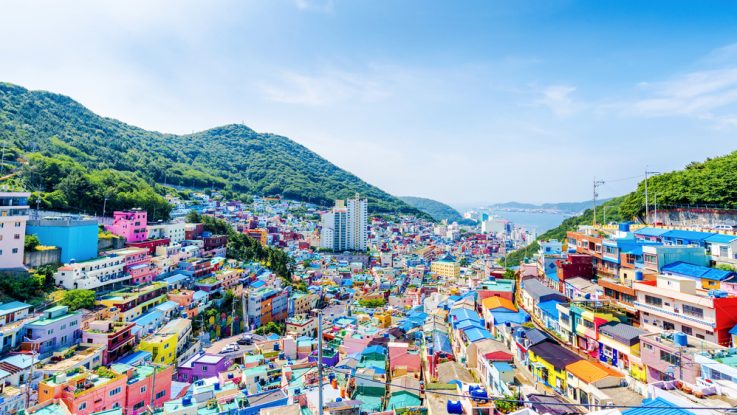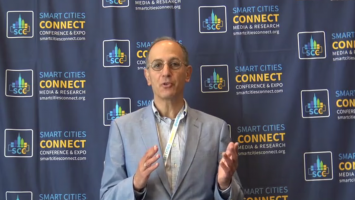
Two years ago in 2017, I attended the first ever World Smart City Week in South Korea. I was in awe of the certitude and progress that had quickly launched Korea ahead of the curve in infrastructure, innovation, and – most importantly – the ability to reach across municipal silos for the greater good. Now, two years later and under the new name of World Smart Cities Expo, the event is stronger than ever, in cooperation with the domestic Ministry of Land, Infrastructure and Transport; Ministry of Science and ICT; Ministry of Environment; and Ministry of Foreign Affairs, as well as the Global Infrastructure Cooperation Conference. Smart Cities Connect travels back September 4-6, for the meeting of 65 countries, 250 exhibitors, and up to 3,000 individuals, complete with an awards ceremony and networking opportunities each day.
In anticipation of our trip, I had the great pleasure to interview Mr. BAE Sung-ho, Director of Urban Economic Division of the Ministry of Land, Infrastructure and Transport of Korea, one of the key collaborators on the event, about their work to make South Korea a smarter community. To hear more about their incredible success thus far and their ongoing efforts, check out our conversation below:
LB: What does it mean to be the Director of the Ministry of Land, Infrastructure and Transport of Korea?
Mr BAE Sung-ho: My name is BAE Sung-ho and I am the Director of Urban Economic Division of the Ministry of Land, Infrastructure and Transport (MOLIT) of Korea. As a central ministry of Korea, MOLIT oversees policies in the areas of national territory/land, housing, city, road, construction, transportation (motor vehicle, aviation, rail) and logistics. Responsibilities of directors include policy drafting, management of relevant laws and regulations and implementation of projects. As the Director of Urban Economic Division, I am in charge of such matters in the smart city area.
LB: How does your job overlap with decisions related to the smart city status in Korea?
Mr BAE Sung-ho: As the case for smart city grew stronger, MOLIT enacted measures to support smart city development in Korea. MOLIT’s role in smart city development includes determining the scope and scale of government-funded smart city projects, improving regulations to promote domestic smart city industry, nurturing the industry’s ecosystem by providing support for businesses, and pursuing international cooperation to export Korea’s smart city policy and model.
During the period of economic expansion and urbanization in Korea, the government played an important role. As Korea develops smart city now, MOLIT, as part of the Korean government, will remain closely engaged in the process in partnership with the private sector.
LB: What smart project have you overseen/completed of which you are most proud?
Mr BAE Sung-ho: I would say development and distribution of a ‘smart city platform’ under the U-City program. A smart city platform is a system that links data servers/systems of municipal governments and agencies for efficient management of urban functions such as transportation, policing, and disaster response. As of 2019, the platform was distributed to 37 municipalities and the goal by 2022 is to raise the number to 108.
Moreover, the platform will gradually expand beyond safety (112 and 119 dispatch) and include welfare and environment.
Such linkage among functions like between safety and administration can make cities a lot safer. Indeed, when we surveyed a city which introduced the platform, the crime rates in the city dropped by 6.2% while the rate of criminal arrest increased by 2.7%. The 911 dispatch time was cut from 7 hours 26 minutes to 5 hours 58 minutes and cases of seven-minute dispatch increased from 63.1% to 78.5%. In combination with the ICT, the platform also created new services such as missing child prevention and care for the elderly with dementia. All of these new services will likely improve citizens’ well-being.
LB: What smart project(s) do you have in progress? Why is it important to the growth of the country?
Mr BAE Sung-ho: Drawing on Korea’s ICT progress and new town development experience over the years, the government unveiled its smart city policy in 2003. At that time, Korea made an unprecedented move by passing the world’s first legislation on smart city development. Smart city development in Korea can be divided into three stages. During the first stage which lasted until 2013, Korea built a network for high-speed internet connection in new towns under construction. The second stage was about connecting data servers and systems of the public sector to realize smart infrastructure. And under the third stage, which is unfolding now, various programs – such as building a test bed for technologies emerging from the fourth industrial revolution, connecting cities’ networks, designing and testing new urban services, and creating a business ecosystem – are emerging.
Smart city development is instrumental to a nation’s development. As a city, it drives growth and innovation and, when combined with new technological trends such as self-driving, drone, Energy Prosumer, smart home, and smart health, the city becomes a platform for technological convergence and spread. This, in turn, creates a virtuous cycle where new technologies attract investments and new businesses getting these investments create new jobs. To sum up, a smart city creates an ecosystem for innovation.
LB: How do you define a smart city? What is the most important component of a smart city?
Mr BAE Sung-ho: A smart city can be defined in many ways depending on the income level, social characteristics, and urban environment of a nation; and this explains different approaches countries are taking to smart city development. There are presumed to be over 120 definitions of smart city in use now; but in general, “smart city” is defined as a city where technologies such as ICT and Big Data are applied to solve urban problems and improve living.
There are many components that make up a smart city, but I believe the key component of a successful smart city is data. A city’s ability to collect, store, and share data is what makes it smart. It would not be an overstatement to say that in the future, the ability to gather and use data will determine a city’s competitiveness. Data from urban infrastructure will be shared and businesses will put this data into use by developing solutions.
LB: How is Korea’s approach to smart cities unique from the approach in other countries?
Mr BAE Sung-ho: Korea’s smart city approach has many unique features but differentiation of strategies by urban development stage is probably what sets Korea apart from others. Under this strategy, we design a smart city model tailored to each city, be it an old city needing renewal or an area waiting for new town development.
It is a departure from the conventional approach so far where, in the developed countries like Europe, most urban planning involves the former and in the emerging countries, the latter. In Korea, we apply our expansive know-how covering both new town development and urban regeneration as needed in each case.
As an example, Korea launched the National Smart City project. The concept of the project is to build from scratch a high-tech city where innovations from the fourth industrial revolution are fully integrated into the city. The master plan for the project is complete and we are waiting for the construction start under the goal of moving in residents from 2021.
LB: What hopes do you have for the upcoming World Smart Cities Expo?
Mr BAE Sung-ho: As the smart city emerges as a major trend, countries are competing to lead the trend. It means big investment in technology, but it also involves building a global network by hosting international conferences or seminars on the smart city. In case of Korea, it has yet to hold such a popular event, and I find this very unfortunate given what Korea can share in terms of technology and experience.
Accordingly, to raise Korea’s profile on the global smart city arena and shape the trend, MOLIT hosted its first smart city conference called World Smart City Week in September of 2017 and, based on what we experienced and learned while holding the event, MOLIT will re-launch the conference as World Smart Cities Expo this year and develop it as the best smart city platform in the world.
Through the Expo, MOLIT will build a global network of international organizations, research institutes and universities to lead the global smart city trend and encourage interactions between companies and other industry stakeholders to deliver concrete results. To increase public’s interest in the field, various public events will be planned, too. I hope the first World Smart Cities Expo will succeed this year and become the leading smart city festival in Asia Pacific going forward.
LB: What do you hope the world comes to know about because of your work?
Mr BAE Sung-ho: Outside Korea, the country is usually associated with fast growth or IT. But one value that MOLIT emphasizes in its pursuit of smart city development is inclusiveness. By utilizing technologies, we want to improve lives of people, especially the lives of the elderly, children, and people with disabilities and make their living in cities more convenient. Seen from this perspective, smart city means to Korea a shift in paradigm – a shift to put people at the center of city.
People play a central role during the planning stage, too. Civic participation is one important condition of public smart city projects. Along with government ministries (Ministry of Land, Infrastructure and Transport, Ministry of Science and ICT, Ministry of Trade, Industry, and Energy, Ministry of Environment, Ministry of Health and Welfare), expert groups, businesses, research institutes, universities and public organizations participate as partners. For citizens, various consultation channels, such as Living lab or online/offline forums are in place to reflect their views.
Learn more about the World Smart Cities Expo and register to attend here.


